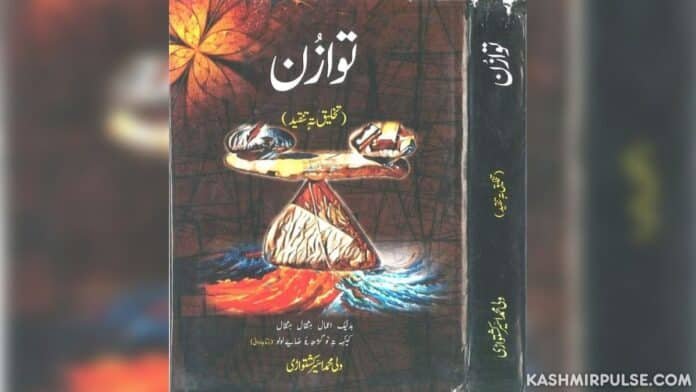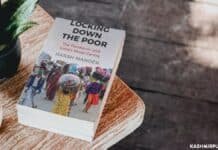
Let’s start the book review of “Tawazun (Takhleeq te Tanqeed)” with the basic question – what is the function of criticism in literature? Is it registration of literary works produced over the years in chronological order? No. Although it isn’t easy to compartmentalize the functions of literary criticism, we can say its basic function is to interpret literary work in a way that increases our appreciation of a work of art by examining and evaluating it so that we are able to get meaningful insights and conclusions based on a justified rationale.
The supposedly critical work “Tawazun” consists of 50 chapters. Each chapter is dedicated to a writer (apart from some three chapters which are devoted to the cultural background of Kishtwar, Kashmiri literature of Chenab valley and the contribution of Kashmiri Pandits.) Is there any systematic approach followed throughout the book? Any attempt to develop a relationship of content to cultural politics, religion, society, and even politics? Is the form and content of the work influenced by the writer’s gender? Put as many questions as you want based on the wide spectrum of critical approaches, be it formalistic, historical, psychological, sociological, biographical, or archetypal. There isn’t single evidence where the writer is per se engaged in literary criticism.
“The first qualification for judging any piece of workmanship from a corkscrew to a cathedral is to know what it is, what it was intended to do and how it is meant to be used,” C.S. Lewis, a literary critic, argues in the preface to Paradise Lost (p.1). I would like to ask where we may place the present book in the spectrum of criticism. Does it touch the chords of criticism anywhere or is it just an amateurishly titled book Criticism and Creation?
What’s inside such a fat book?
One may humbly like to ask and desire to know what is written after all in such a fat book.
Pick up any chapter from ‘Tawazun (Takhleeq te Tanqeed)’ and you find that there are two types of introductions – one starting from the date and place of birth and then a complete record of an author’s educational qualifications followed by a job profile – from which post, he started and at what position he got superannuation.
One beholds a complete list of books published by authors without discussing their literary value. One may argue that someone’s biography is important for a critical evaluation of their work but one wonders that after spending so much energy on the biographical aspect, there is no attempt to make the biographical details a base for arguments regarding the body of work of the particular writer.
Literary criticism has no place in ‘Tawazun’
I wonder why the author has spent so much energy on it when he hasn’t used it at all for his main concern – literary criticism. Instead, the biographical details are followed by a montage of passing references quoted previously by any writer in his/her article or newspaper, reviewer or historian. And then we reach the happy endings where our respected critic showers heaps of praise on the writer he is supposedly evaluating.
Let’s take some examples randomly. Chapter 50 titled Farooq Shaheen as a Critic starts with how his book which was awarded Sahitya Akademi Yuva Puraskar (2012) introduced him in literal circles and his other works including translation. Then a complete biographical sketch of him is given followed by some random passages from his award-winning book without drawing any conclusion from them. Whatever has been said about Farooq Shaheen by some writers in their works is recorded again and lastly, Dr Iqbal’s couplet about Shaheen is quoted with a comment that the author feels as if it was said for Farooq Shaheen.
Chapter 27 titled Eminent Kashmiri Essayist – Prof. Mohd Zaman Azurdah. As usual, the chapter is introduced detailing Azurdah’s books followed by references about him from Kashmiri literary history by Naji Munawar and Shafi Shauq. It is pertinent to mention here, the reference from this history is almost quoted about each person and in every chapter. It is followed by his complete biography and job profile as we see in service records highlighting in bold letters how many research scholars worked under his supervision. Don’t forget to note his house number too is mentioned. At last, he says, Prof. Muhammad Azurdah, an eminent essayist, wonderful orator deserves honour and respect for writing 30 essay collections in Urdu and Kashmiri.
Chapter 47 in “Tawazun” is titled Dr Gulzar Ahmad Rather and his Compilations and consists of nine pages, giving us the book names he has compiled, the book chapters he has written. Dr Gulzar’s complete biography is followed by his educational qualification which reads like a resume. The author Wali Muhammad Aseer believes despite having high qualifications, it was destined that Dr Gulzar should work in the Jammu and Kashmir Academy of Art Culture and Languages. Author has quoted the poem ‘Gulzar’ written by Ayub Sabr, an opening verse of which is “Rut anhaar chum gulzar, Dilbar yaar chum gulzar”. The writer quotes unnecessarily so many references from his compilations and other literary figures of Kashmir without making any point. Finally, the author has only one complaint from Dr Gulzar that he uses English numerals instead of Urdu in his body of work.
Noman Holland writes that “literary criticism… takes as its subject matter, not a text, but the transaction between a reader and a text”, “Five Readers Reading, New Haven, 1975,” p.248. However, one fails to find any such transaction in the whole book. Say if one were to ask literary critics who have immensely contributed to the field whether this is criticism, they would say a big no because literary criticism, as New Critics, must deal with “words on the page.”
Unnecessary praises prominent instead of humble suggestions
Like all other places, we aren’t indifferent. We too love to adorn our book with a foreword, afterword, blurbs, prefaces etc. It is a token of love and a way of appreciation for one’s creativity but shouldn’t we play the role of responsible citizens? Why should there be unnecessary praises for something which deserves humble suggestions? Doesn’t the onus lie on all of us who write such introductory words for the books? And same is true for Muhammad Yusuf Tiang, Prof Margoob Banhali and Prof Shad Ramzan who have written in praise of this book.
Summing up, should we consider such books as criticism or the literal biography? Should books like “Tawazun – Takhleeq te Tanqeed” be long-listed for national awards? Should such books bag a national award in the criticism genre? Does this suggest to us something mischievous from regional coordinators? How is the mechanism of jury constitution taking place? What impact does it have on our future generation? Do we rob the scholarship ethics of our creative writers through such decisions? Are we producing a generation bereft of confidence? These are some of the uncomfortable questions that we need to ask ourselves while deciding the merit of critical work and forwarding it for a national award.
Book: Tawazun (Takhleeq te Tanqeed)
Genre: Criticism
Author: Wali Muhammad Aseer
Publisher: Taj Printing Services – Delhi
Year of Publication: 2019
ISBN: 978-93-5382-974-2
Pages: 548
Price: ₹500 / $6.77 (Approx.)
Follow Us
The Kashmir Pulse is now on Google News. Subscribe our Telegram channel and Follow our WhatsApp channel for timely news updates!




![Dark Endeavour [Book Review] Dark Endeavour [Book Review]](https://kashmirpulse.com/wp-content/uploads/2022/06/Dark-Endeavour-Book-Review-218x150.jpg)





